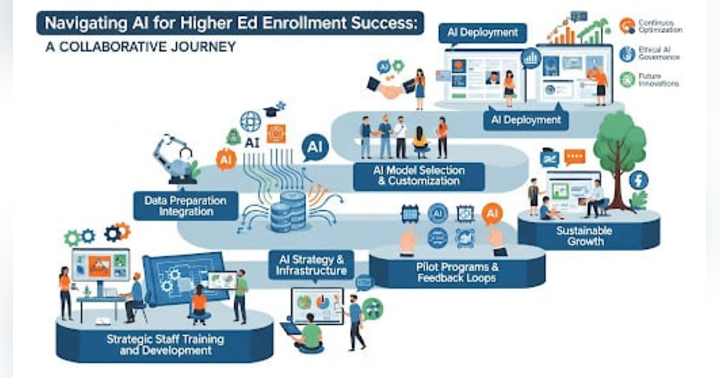Interview with Steve Foerster of Success Learning Center

Can you tell me about the work you're currently doing at Success Learning Center?
Success Learning Center is a professional training center in Lagos, Nigeria. It’s been open for about a year now, and we offer courses both online and at our facility in business and information systems. In addition to offering our own courses, we’re also an accredited testing center for ICDL, an international organization that offers certifications in a pretty wide variety of information systems areas.
We actually didn’t start out planning to focus on non-credit training. Our first plan was to set up a licensed university to offer undergraduate programs in these same topics. We took quite a few steps in that direction, even running a pilot program taking a handful of students through an entire Bachelor degree curriculum in business administration so that we could use their feedback to refine our approach and processes.
But the bureaucratic obstacles to licensure were pretty considerable, so we pivoted to non-credit training because it allows us to reach the people we want to help with a positive impact now, without being strangled by as much regulatory red tape. We still plan to do a university in a later phase, but at this point we expect that will be a US-based project rather than one based in Nigeria. Stay tuned!
My role in all this has been pretty hands on. I primarily provide overall direction and manage the technology and curriculum development side of things, in part because those are all things that can be done remotely and in part because I have the skill set for them. But because I’m based in Northern Virginia and not on site, I’m not the right person to be Managing Director. My business partner and spiritual brother Kola Bakare oversees things directly, including our staff and our facility there. So instead my official job is to Chair the Board of Directors while Kola serves as Managing Director, and he and I cooperate closely.
How did your education at GW lead you there?
It’s actually the other way around! I knew that I wanted to get into educational entrepreneurship ever since I first took staff positions at universities in the early 2000’s. Because of that, after I finished a Bachelor degree in information systems at a small state school, I looked for a graduate program that would give me the right combination of skills to lead an online educational project. GW offered a Master of Arts in Educational Technology Leadership, and that fit my requirements perfectly. And back then, tuition and fees for that particular program were much lower than they are now, which helped a lot.
What general advice would they give to a current GW student looking to pursue a career in education or education policy, broadly defined?
“Education” is a really broad field, so it’s tough to give advice that would fit everyone. It encompasses everyone from K-12 schoolteachers and administrators, to college and university professors, to professional training instructors, to trainers who work for corporations. And as you suggest, it also includes those interested in education policy: regulators, lobbyists, and researchers.
When it comes to those interested in a policy career, I’d encourage them to take a few courses in economics, especially microeconomics. There’s no better way to gain an understanding of how far the intentions and results of public policy can diverge, why that divergence happens, and how it can adversely impact students and educators at every level. The peril of unintended consequences from public policy is very real, but it’s rarely unpredictable.
The other advice goes for everyone: don’t get complacent, stay up to date on new developments. One of those areas of development is technology. There are a lot of educators and decision makers at educational institutions who have been utterly blindsided by the rise of large language model AI. You can see it in higher education, where many instructors and administrators still have no idea what to do now that students can ask a bot to generate an essay for them instead of learning to think strongly enough to write one on their own.
But technology isn’t the only area where developments matter. Keeping abreast of social changes matters too. For example, there’s an unprecedented mental health crisis among those who are traditional college age, and it dramatically affects the educational experience for students who are suffering from it.
What classes at GW have proved most useful in your career? How so?
I earned my Master degree nearly twenty years ago, and many of the courses in my program were technical, so at this point they’re a bit out of date. But I did take a course in education policy that was very informative, and the course I took in instructional design has served me well ever since. I think I still have my final project somewhere on my hard drive.
Ultimately, however, it’s not always the course content that is the most important takeaway from a university program. If you’re a twenty-year old university student, right now you’re in the best environment for personal and professional networking that you will ever enjoy. Take advantage of it! And the best way to do that is to offer to help other people reach their goals. They’re sure to appreciate it, and by lending a hand on a project in someone else’s area of interest you’ll learn things you may not have otherwise, things that you may be glad to have picked up later on.
What would you most like to tell your 20 year old self?
The first thing would be to make sure that someday, when I hear about this weird thing called “Bitcoin”, that I mine a ton of it while it’s still just ten cents apiece. And the next few things would be relationship advice—and the less said about that, the better.
But yes, eventually I would get around to professional advice. I suppose if there’s any one thing, it would probably have been to worry less about whether I was ready to do big things, and just go ahead and do them. It’s okay if that means that things may not go as planned. I’ve learned more from trying unwise things that went hilariously wrong than I ever did in a classroom. As John C. Maxwell said, “Fail early, fail often, but always fail forward.”
What is the biggest problem in education today, and how would you go about fixing it?
There are so many opportunities to make education better that it’s really challenging to pick just one! With Success Learning Center, our goal has been to make professional education more accessible to those who need it the most. I don’t know if I’d call that the biggest problem in education today, but I can live with our decision. Ultimately, all we can do is find our preferred little piece of the world to try to make better. Some of us can manage a bigger piece than others, and that’s okay. Like the saying goes, no one can do everything, but everyone can do something.


























